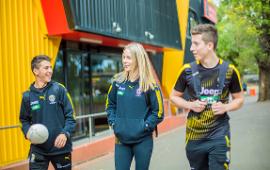Swinburne partnership with Richmond off to a roaring start

In Summary
- Swinburne and Richmond are developing sports leaders at the Richmond Institute of Sports Leadership
- Indigenous students at Richmond’s Korin Gamadji Institute have taken part in Swinburne’s Marngo Designing Futures program
- Swinburne students are gaining real-world work experience at the club
The partnership between Swinburne and Richmond Football Club has seen a number of successful outcomes in the areas of research, education, equity, and diversity.
Officially partnering in 2017, Swinburne has built on its existing relationship with the football club through its work with the Richmond Institute of Sports Leadership (RISL) in 2016.
Developing sports leaders
RISL’s unique, co-delivered program is aimed at developing the next generation of sports leaders through a dual Diploma of Sports Development/Diploma of Leadership and Management.
In just two years numbers in the dual diploma have grown from 45 students in 2017, to 130 currently undertaking the course at the Swinburne Centre at Richmond’s Punt Road Oval.
Students have benefited from learning in state-of-the-art facilities, hearing from Institute Ambassadors and have had the opportunity to take up industry placement and employment opportunities.
Executive Director of Pathways and Vocational Education, Mish Eastman, says Swinburne is thrilled to be involved in delivering this quality education experience.
“It’s wonderful to see RISL expanding its reach and offering this unique program to a new group of talented young people. We’re excited to engage with a new community of future sports leaders and teach them practical sports management and leadership skills,” Ms Eastman says.
Designing futures with Marngo and Korin Gamadji Institute
Led by Swinburne’s Dr Samantha Edwards-Vandenhoek, the Marngo Designing Futures program has worked with Richmond’s Korin Gamadji Institute (KGI), an educational and training facility encouraging leadership and employment pathways for Aboriginal and Torres Strait Islander people.
Dr Edwards-Vandenhoek is also working with the KGI Richmond Emerging Aboriginal Leadership (REAL) program, working with Aboriginal and Torres Strait Islander youth to help develop their cultural connections. It supports leadership skills, physical and mental well-being, and career aspirations.
Through the Richmond and Swinburne partnership, secondary students enrolled in the KGI REAL Program have the opportunity to participate in Marngo Designing Futures.
The program aims to help demystify university life for Indigenous secondary students using art, design and media.
“This ties into Swinburne’s broader strategy and partnership goals with the football club,” Dr Edwards-Vandenhoek says.
Introducing people to AFL
In May this year, a group of international, migrant and rural Swinburne students attended their first AFL match between Richmond and St Kilda.
The aim of the My First Footy Experience program is to introduce students from a range of backgrounds to AFL and give them the chance to connect with their peers socially and culturally outside of university.
Diversity and Inclusion Coordinator at Richmond Football Club, Rana Hussain, says sport is a great connector that unites people under their team’s colours.
“Sport is a common language and everyone is equal on the field. AFL is such an exhilarating game that no matter who you are, anyone can enjoy the spectacle,” Ms Hussain says.
“At Richmond, we welcome people from everywhere to join our community, learn about the game and enjoy this great sport.”
Gaining real-world work experience
Swinburne students have had the opportunity to gain real-world work experience at Richmond, taking up professional internships in areas such as business and design.
Bachelor of Design (Communication Design)/Bachelor of Business student, Osama Sarakibi, completed an internship with the club as a graphic designer, working on branded collateral, updating ticketing forms and photo editing.
“Since undertaking the Richmond internship, I have grown a strong appreciation for in-house design, particularly in the corporate sector,” Mr Sarakibi says.
“Richmond has allowed me to exercise creative freedom within my internship. I didn’t expect to work on projects that allowed me to compose elements using my own discretion. The flexibility and freedom to have this personal input was something that I valued and most enjoyed about the internship.”
Advancing reconciliation
In December 2018, Swinburne will host Australia’s first national Reconciliation Action Plan (RAP) conference at the Swinburne Centre at Richmond’s Punt Road Oval. The conference will provide a forum to explore the RAP program and share examples of best-practice.
There are over 1000 Australian organisations with RAPs and only 23 of these organisations have Elevate RAPs. Swinburne is the first university and Richmond Football Club is the first sporting organisation to receive an Elevate RAP.

